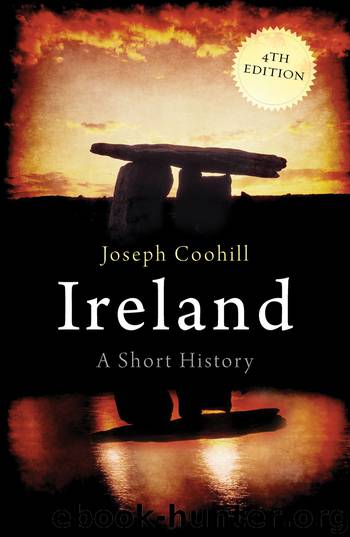Ireland by Joseph Coohill

Author:Joseph Coohill [Coohill, Joseph]
Language: eng
Format: epub
Publisher: Oneworld Publications
Published: 0101-01-01T00:00:00+00:00
WAR IN EUROPE AND WAR IN IRELAND, 1914–22
The First World War split Irish nationalists. Some, like Redmond, thought that the war was for the freedom of small nations, and that Ireland should support the allies since it was a small nation struggling for freedom. He argued that if the Irish volunteered for the British army and fought in the war, then Irish claims for independence would be taken more seriously by both Britain and the international community after the war. But many other nationalists, including Sinn Féin and the IRB, were opposed to the war and could not conceive of an alliance with Britain. The effect of this was that the Irish Volunteers split into those who supported participation in the war (and who changed their name to the National Volunteers), and those who opposed entry into the war (who retained the name Irish Volunteers). The National Volunteers were in the majority, and many of them joined the British army. Although they were a minority, the new Irish Volunteers were more militant in their thinking, and began planning for an insurrection. The IRB also became more heavily involved in militant nationalism when their organizational director, Patrick Pearse (1879–1916), began to strengthen links between the IRB and the Irish Volunteers. Pearse, along with Joseph Mary Plunkett (1887–1916) and Thomas MacDonagh (1878–1916), thought that a revolution was necessary not only to gain independence, but to cleanse Ireland of its confused efforts at Home Rule and to provide a blood sacrifice as a symbol to the Irish people. (This was not unique thinking at the time. Some British and French intellectuals thought that the First World War would prove to be a cleansing experience.) Pearse was a powerful orator and on 1 August 1915, he gave the funeral oration for Jeremiah O’Donovan Rossa, the old Fenian who had died in New York and whose body had been returned to Ireland. At Glasnevin Cemetery in Dublin, Pearse used O’Donovan Rossa’s body to symbolize the dead heroes of Ireland’s struggle against Britain, and said that, no matter how many weak Home Rule bills were passed, the Irish would not rest until they had achieved full independence. His oft-repeated words became slogans for militant nationalism.
Download
This site does not store any files on its server. We only index and link to content provided by other sites. Please contact the content providers to delete copyright contents if any and email us, we'll remove relevant links or contents immediately.
| Africa | Americas |
| Arctic & Antarctica | Asia |
| Australia & Oceania | Europe |
| Middle East | Russia |
| United States | World |
| Ancient Civilizations | Military |
| Historical Study & Educational Resources |
Room 212 by Kate Stewart(5101)
The Crown by Robert Lacey(4796)
Endurance: Shackleton's Incredible Voyage by Alfred Lansing(4747)
The Iron Duke by The Iron Duke(4343)
The Rape of Nanking by Iris Chang(4193)
Joan of Arc by Mary Gordon(4088)
Killing England by Bill O'Reilly(3989)
Say Nothing by Patrick Radden Keefe(3972)
I'll Give You the Sun by Jandy Nelson(3424)
Shadow of Night by Deborah Harkness(3350)
Hitler's Monsters by Eric Kurlander(3324)
Mary, Queen of Scots, and the Murder of Lord Darnley by Alison Weir(3194)
Blood and Sand by Alex Von Tunzelmann(3186)
Eleanor & Park by Rainbow Rowell(3144)
Darkest Hour by Anthony McCarten(3114)
Margaret Thatcher: The Autobiography by Thatcher Margaret(3071)
Book of Life by Deborah Harkness(2919)
Red Famine: Stalin's War on Ukraine by Anne Applebaum(2914)
The One Memory of Flora Banks by Emily Barr(2851)
